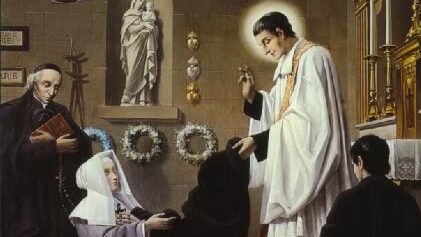St. Louis-Marie was born in Montfort, Brittany, on January 31, 1673. As a child, he was extremely devoted to the Blessed Sacrament and the Virgin Mary, praying the rosary often. He took the name Marie at his confirmation.
At school, Louis-Marie joined a society of young men who ministered to the poor and sick on school holidays. When he was 19, he walked 130 miles to Paris to study theology. He gave all his possessions to the poor he met along the way, and made a vow to live only on alms. After he was ordained at 27, Louis-Marie served as a hospital chaplain until management, resentful of his reorganization efforts, sent him away.
When he was 32, Louis-Marie discovered a gift for preaching, and committed himself to it for the rest of his life. He often drew crowds of thousands, and encouraged them to devote themselves to Mary and to receive communion often.
Louis-Marie met with opposition from the Jansenists, a heretical movement in the Church that believed in absolute predestination. Much of France was influenced by this false thinking, including many bishops, who banned Louis-Marie from preaching in their dioceses. Louis-Marie was poisoned by Jansenists in La Rochelle, but survived, although he suffered poor health afterwards.
While he was recuperating, Louis-Marie wrote “True Devotion to the Blessed Virgin,” a masterpiece of Marian piety which he correctly prophesied would be hidden by the devil for a time. It was discovered 200 years after his death.
A year before he died, Louis-Marie founded the Daughters of Divine Wisdom, which tended to the sick in hospitals and educated poor girls, and the Company of Mary, a group of missionaries devoted to preaching and spreading devotion to the Blessed Mother.
St. Louis-Marie is famously known for his prayer of entrustment to Our Lady: “Totus tuus ego sum.” (“I am all yours.”) St. Pope John Paul II took the phrase “Totus tuus” as his episcopal motto.

